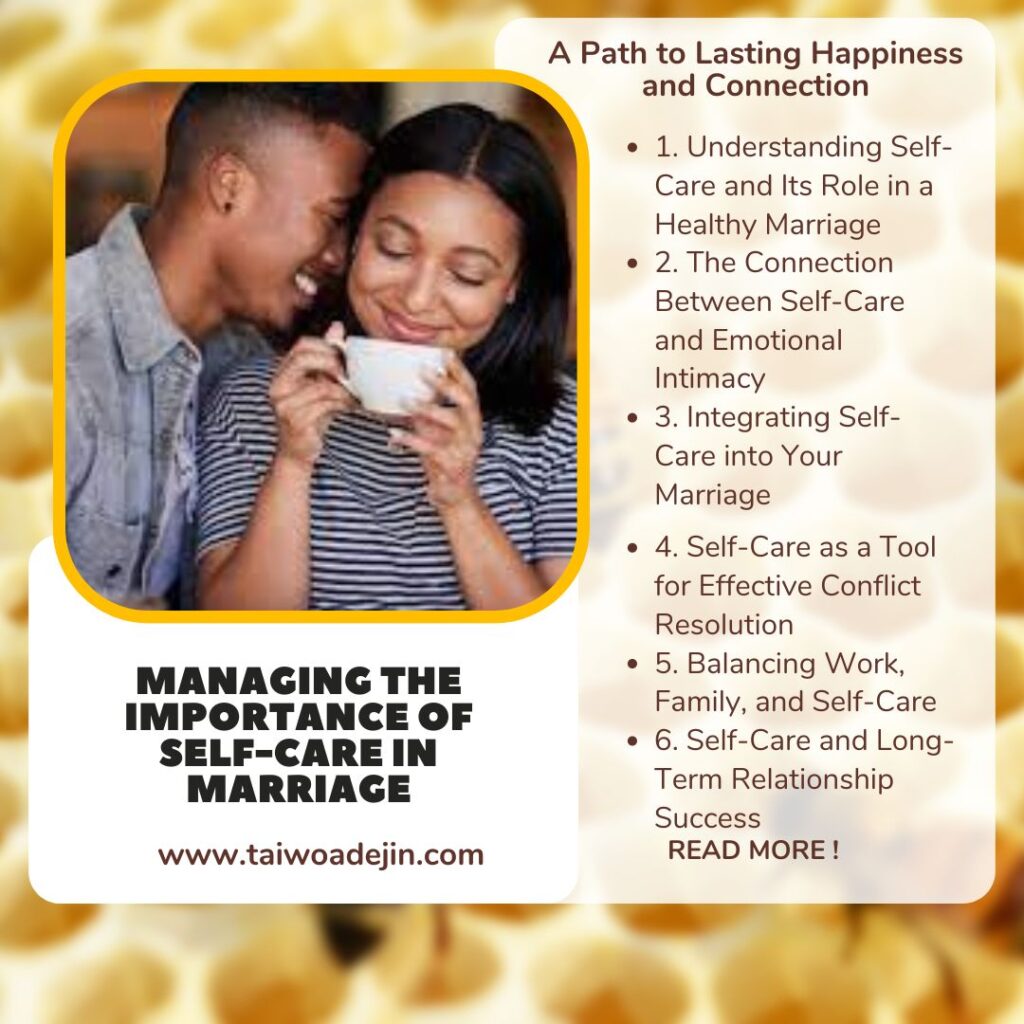
A Path to Lasting Happiness and Connection
Marriage is a journey that requires constant nurturing and attention. While much emphasis is often placed on maintaining emotional intimacy, resolving conflicts, and balancing work and family life, one crucial aspect that often gets overlooked is self-care.
In this article, we will explore the importance of self-care in marriage, why it’s essential for both partners, and how it can contribute to a healthier, more fulfilling relationship.
The Importance of Self-Care in Marriage
Self-care is often misunderstood as a selfish or indulgent practice, but in reality, it’s a vital component of maintaining a healthy relationship. When both partners prioritize their well-being, they bring their best selves to the marriage, fostering a stronger, more resilient bond.
1. Understanding Self-Care and Its Role in a Healthy Marriage
Self-care involves taking intentional actions to nurture your physical, emotional, and mental well-being. It can include activities like exercise, meditation, hobbies, or simply setting aside time to relax. In the context of marriage, self-care ensures that each partner is fulfilled and capable of contributing positively to the relationship.
Key Points:
- Physical Well-being: Regular exercise, a balanced diet, and adequate sleep are foundational aspects of self-care. These contribute to better physical health, which in turn supports mental and emotional well-being.
- Emotional Health: Taking time to process your emotions, whether through journaling, therapy, or simply talking with friends, is essential for emotional stability.
- Mental Recharge: Engaging in activities that stimulate your mind, such as reading, learning new skills, or practicing mindfulness, can help reduce stress and keep your mind sharp.
2. The Connection Between Self-Care and Emotional Intimacy
Maintaining emotional intimacy is crucial for a healthy marriage, and self-care plays a significant role in this. When both partners are emotionally and mentally balanced, they are more likely to connect on a deeper level, share their vulnerabilities, and support each other through life’s challenges.
Key Points:
- Emotional Availability: Self-care enhances your emotional availability, making you more present and engaged in your relationship.
- Stress Reduction: By managing stress through self-care, you prevent it from spilling over into your relationship, which helps in maintaining emotional intimacy.
- Building Trust in Relationships: When you take care of yourself, it shows your partner that you value your well-being and, by extension, the health of the relationship. This builds trust and respect between partners.
3. Integrating Self-Care into Your Marriage
Incorporating self-care into your marriage doesn’t mean spending time apart; it can also be about finding ways to nurture yourselves individually and together. Here are some strategies for integrating self-care into your relationship:
Key Points:
- Support Each Other’s Self-Care: Encourage your partner to engage in self-care activities and respect their need for personal time.
- Shared Self-Care Activities: Engage in activities that promote well-being together, such as going for walks, cooking healthy meals, or practicing yoga. These can enhance your connection while promoting health.
- Open Communication: Discuss your self-care needs with your partner. This ensures both of you understand and support each other’s efforts to maintain well-being.
4. Self-Care as a Tool for Effective Conflict Resolution
Conflicts are inevitable in any marriage, but how you handle them can make all the difference. Self-care can be a powerful tool for effective conflict resolution strategies, as it helps you approach disagreements with a calm and balanced mindset.
Key Points:
- Emotional Regulation: Regular self-care practices, such as mindfulness or meditation, can improve your ability to regulate emotions, leading to more constructive conflict resolution.
- Perspective: When you’re well-rested and mentally clear, you’re better equipped to see your partner’s point of view and find mutually beneficial solutions.
- Patience and Compassion: Self-care can increase your patience and compassion, allowing you to approach conflicts with a focus on resolution rather than escalation.
5. Balancing Work, Family, and Self-Care
Balancing work and family life is a common challenge for many couples, and self-care often takes a backseat. However, neglecting self-care can lead to burnout, which can negatively impact your marriage. Finding a balance is key to maintaining harmony in your relationship.
Key Points:
- Prioritize Self-Care: Make self-care a non-negotiable part of your routine. This might mean scheduling time for exercise, hobbies, or relaxation into your weekly calendar.
- Delegate Responsibilities: Share household and family responsibilities with your partner to free up time for both of you to engage in self-care.
- Work-Life Boundaries: Set clear boundaries between work and personal life to ensure that you have enough time to recharge and spend quality time with your partner.
6. Self-Care and Long-Term Relationship Success
Self-care is not just about immediate well-being; it’s also an investment in the long-term success of your marriage. By consistently prioritizing self-care, you build a foundation of resilience that can help your marriage withstand challenges over time.
Key Points:
- Preventing Burnout: Regular self-care helps prevent burnout, ensuring that both partners remain engaged and committed to the relationship.
- Sustaining Emotional Intimacy: Over time, self-care supports sustained emotional intimacy by keeping both partners emotionally balanced and connected.
- Strategies for Saving a Failing Marriage: For marriages that are struggling, reintroducing self-care can be a pivotal step in revitalizing the relationship and providing both partners with the energy and clarity needed to address deeper issues.
Conclusion
Self-care is a vital component of a healthy, thriving marriage. By prioritizing your well-being, you ensure that you can bring your best self to the relationship, fostering emotional intimacy, effective conflict resolution, and long-term happiness.
Integrating self-care into your marriage not only enhances your individual well-being but also strengthens the bond you share with your partner. Remember, a healthy relationship starts with healthy individuals.
Thank you for reading!
Share this content:






Good article and right to the point. I am not sure if this is in fact the best place to ask but do you guys have any thoughts on where to get some professional writers? Thanks in advance 🙂
Thank you—I’m glad the article was clear and helpful! 🙂
As for professional writers, you’re in the right place.
I create impactful digital content that connects deeply and delivers more value than what you’ll find on platforms like Upwork or Fiverr.
I’ll be happy to render my service at anytime 🙌.